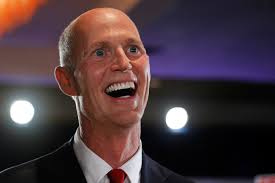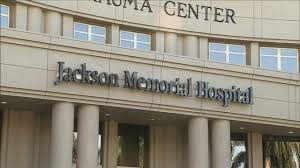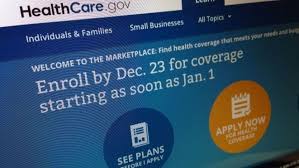Giddy Republicans are about to dismantle the Affordable Healthcare Act, removing a safety net that catches 2.2 million Floridians who may otherwise not have insurance. Meanwhile, Gov. Rick Scott and our state GOP legislators  want to turn Medicaid into a capped voucher system that could cut out some people with chronic care needs.
want to turn Medicaid into a capped voucher system that could cut out some people with chronic care needs.
At the same time, there’s talk — and even a Florida House bill — about replacing existing federal matching funds for 4 million Florida Medicaid patients (including 2.3 million children), that are now eligible via federal guidelines, to “block grants” that would allow states to make its own decisions on how to spend those funds — and on whom.
Ouch. That’s gonna hurt some people.
So say the doctors and nurses at Jackson Memorial Hospital, who know first hand what its like to treat a community that uses the emergency room as its primary care center.  There is never any follow up. Chronic illnesses get worse. People miss work. They self medicate. They begin to depend on other public programs and end up in the ER again — costing taxpayers more in the long run.
There is never any follow up. Chronic illnesses get worse. People miss work. They self medicate. They begin to depend on other public programs and end up in the ER again — costing taxpayers more in the long run.
Jackson staff will join other health advocates and patients Thursday to highlight what exactly is at stake if the GOP gets its way. That includes the possible reduction of $33 billion in federal funding for healthcare over the next 10 — insufficient funding to provide the current level of services for enrollees, Florida’s Legislature will have to choose between increasing revenue, limiting enrollment, reducing services, or lowering provider reimbursement rates.
This is the point of Thursday’s rally at the Miami stop for the Save My Care Bus Tour, a two-month, cross-country tour that has traveled more than 7,000 miles to at least 30 events in 15 states to tell the stories of the more than 30 million Americans who will lose their health care under a repeal plan.
People like Gloria Bauta, a doula in Miami for 17 years. Bauta, 37, was not able to afford health insurance until the ACA was passed. Since college, she has suffered from chronic pain and gastrointestinal issues. After getting  Obamacare, she was finally able to see a doctor and was diagnosed with multiple autoimmune diseases. She has been able to get various treatments with her affordable care plan.
Obamacare, she was finally able to see a doctor and was diagnosed with multiple autoimmune diseases. She has been able to get various treatments with her affordable care plan.
Like the “town hall” protests during last week’s Congressional recess, the bus tour wants to shine a light on the potential consequences if Republicans at the state and federal level are able to cut a deal to pay for some aspects of their new plan by effectively gutting Medicaid through block grants and per capita caps.
“Every day it becomes more clear that most people want to keep the Affordable Care Act because they recognize that  killing it is a huge step backward for everyone’s health,” said Martha Baker, RN, president of SEIU Local 1991, which represents nurses, doctors and other professionals at Jackson Health System, the state’s largest public hospital.
killing it is a huge step backward for everyone’s health,” said Martha Baker, RN, president of SEIU Local 1991, which represents nurses, doctors and other professionals at Jackson Health System, the state’s largest public hospital.
“If a deal is cut to pay for a bad plan to replace the ACA by reducing coverage to seniors, children, people with disabilities, and veterans, then our elected officials are moving in the wrong direction and our most vulnerable citizens will bear the brunt,” Baker said in a statement.
They fear that Medicaid block grants cap coverage, which means limiting eligibility, establishing waiting lists and cutting reimbursements to healthcare providers. Doctors and patients would be facing impossible choices in just a few years, when the impact of the cuts and capped funding are fully felt.
“The destabilization of Florida’s health safety net threatens to overturn significant progress made for millions of Floridians finally able to afford quality healthcare and will ultimately cost the state’s taxpayers more down the road,” said Katy Huddlestun, an attorney with Florida Legal Services.
Fun facts Ladra learned regarding the repeal of ACA and the Medicaid changes proposed:
- Right now, the federal government guarantees 60% of Medicaid costs in Florida (it goes up to 62% in 2019). It is based on income levels so when more peope qualify, or during emergencies (i.e., hurricanes and Zika outbreaks) the funding increases.

- In Florida, the elderly and the blind and disabled make up only 22.5 % of the current eligible patients (7% and 15.5%, respectively) but account for more than 60% of the costs (21.31% and 39.99%, respectively).
- Florida stands to lose over $8 billion in federal dollars annually. Most of those dollars (more than $6.1 billion) go to pay for the premium tax credits and cost sharing reductions that make insurance affordable for low and moderate-income Floridians.
- Over the next ten years, Florida could lose more than $33 billion, a 23% reduction in federal funding.
- The changes (read: cuts) also represent a potential loss of 180,000 or so jobs.
More statistics and stories like Bauta’s will be shared at Thursday’s rally, which begins at 11 a.m. at 1601 NW 8th Ave., just east of Jackson Memorial Hospital.
Where are our local leaders on this? Miami-Dade and Hialeah — which is one of if not the highest Obamacare enrollment area in the nation — should be front and center in ensuring that our residents keep their healthcare.

